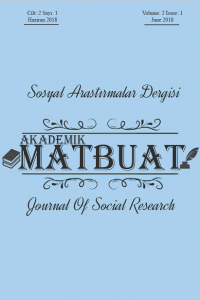Öz
Günümüz dünyasının en belirgin özelliklerinden birisi
de hemen hemen her alanda hızlı değişimlerin olmasıdır. Bu değişimler hem
bireysel hem de toplumsal hayatı etkilemekte, toplumsal kurumlar da bu
değişimden etkilenmektedirler. Eğitim kurumu, bu değişimler karşısında belki de
an fazla ve en kolay değişim gösteren kurumlardan birisi olarak karşımıza
çıkmaktadır. Elbette ki bu değişimleri zorunlu kılan bazı sebepler de vardır.
Yapılan bu kuramsal çalışma, hızla değişen dünyada öğretmenlik mesleğinin bu
değişimlerle ilişkisini, gelecekte öğretmenlik mesleği ile ilgili teorik
bilgilere yer vermektedir. Öğretmenlik mesleğinde; teknoloji, eğitim
yatırımları, sosyal değişmeler, toplumsal talepler, anne baba etkisi,
öğrencilerdeki değişim, kitle iletişim araçları, kalite arayışları vb.
sebeplerden dolayı değişim zorunlu olmaktadır. Öğretmenlerin değişimini gerekli
kılan etmenler sadece bu sayılanlarla sınırlı değildir. Daha pek çok sebep,
öğretmenlerin de değişimini gerekli kılmaktadır. Yakın gelecekte muhtemel bütün
değişimler, öğretmenlik mesleğinin de geleceğini tehdit edebilir boyutlara
ulaşabileceği iddia edilmektedir. Yapılan bazı çalışmalarda özellikle eğitim
teknolojilerinin bütün eğitim faaliyetlerinde kullanılması öğretmenlik
mesleğinin ortadan kalkabileceği şeklinde yorumlanırken, bazı çalışmalarda da
toplumsal bir varlık olan ve duygu boyutu olan insanın bireysel ve toplumsal
ihtiyaçları da gelecekte eğitimin öğretmensiz olamayacağını göstermektedir. Bu
araştırmada varılan sonuca göre öğretmenlik mesleği gelecekte ortadan kalkmaz
ama öğretmenlerin rolleri ve statülerinde değişiklikler olacaktır.
Anahtar Kelimeler
Kaynakça
- Ahmad, M. I., & Mubin, O. (y.y.). Robots likely to be used in classrooms as learning tools, not teachers. Tarihinde 01 Mayıs 2017, adresinden erişildi http://theconversation.com/robots-likely-to-be-used-in-classrooms-as-learning-tools-not-teachers-66681
- Breazeal, C. (2003). Emotion and sociable humanoid robots. International Journal of Human-Computer Studies, 59(1–2), 119–155. https://doi.org/10.1016/S1071-5819(03)00018-1
- Cejka, E., Rogers, C., & Portsmore, M. (2006). Kindergarten robotics: Using robotics to motivate math, science, and engineering literacy in elementary school. International Journal of Engineering Education, 22(4), 711.
- Çakmak, M. (2011). Changing roles of teachers: Prospective teachers’ thoughts. Egitim ve Bilim, 36(159), 14.
- Deiro, J. A. (2005). Teachers do make a difference: The teacher’s guide to connecting with students. Corwin Press.
- Ertürk, S. (1972). Eğitimde Program geliştirme. Ankara: Yelkentepe Yayınları.
- Goldstein, E. B. (2013). Bilişsel psikoloji. İstanbul: Kaknüs Yayınları.
- Harwell, S. H. (2003). Teacher professional development: It’s not an event, it’sa process.
- Hassel, B. C., & Hassel, E. A. (2011). Teachers in the Age of Digital Instruction. Creating Sound Policy for Digital Learning. A Working Paper Series from the Thomas B. Fordham Institute. Thomas B. Fordham Institute. Tarihinde adresinden erişildi http://eric.ed.gov/?id=ED527018
- Jukes, I., McCain, T., & Crockett, L. (2010). Education and the role of the educator in the future. Phi Delta Kappan, 92(4), 15–21.
- Pamuk, S., Çakır, R., Ergun, M., Yilmaz, H. B., & Ayas, C. (2013). Öğretmen ve Öğrenci Bakış Açısıyla Tablet PC ve Etkileşimli Tahta Kullanımı: FATİH Projesi Değerlendirmesi. Educational Sciences: Theory & Practice. https://doi.org/10.12738/estp.2013.3.1734
- Richtel, M. (2011, Eylül 3). Technology in Schools Faces Questions on Value. The New York Times. Tarihinde adresinden erişildi http://www.nytimes.com/2011/09/04/technology/technology-in-schools-faces-questions-on-value.html
- Sharkey, A. J. C. (2016). Should we welcome robot teachers? Ethics and Information Technology, 18(4), 283–297. https://doi.org/10.1007/s10676-016-9387-z
- Soffar, H. (2016, Haziran 20). Robot teachers uses , advantages and disadvantages. Tarihinde 02 Mayıs 2017, adresinden erişildi http://www.online-sciences.com/robotics/robot-teachers-uses-advantages-and-disadvantages/
- Sönmez, V. (2002). Eğitim felsefesi. Ankara: Anı Yayıncılık.
Öz
Kaynakça
- Ahmad, M. I., & Mubin, O. (y.y.). Robots likely to be used in classrooms as learning tools, not teachers. Tarihinde 01 Mayıs 2017, adresinden erişildi http://theconversation.com/robots-likely-to-be-used-in-classrooms-as-learning-tools-not-teachers-66681
- Breazeal, C. (2003). Emotion and sociable humanoid robots. International Journal of Human-Computer Studies, 59(1–2), 119–155. https://doi.org/10.1016/S1071-5819(03)00018-1
- Cejka, E., Rogers, C., & Portsmore, M. (2006). Kindergarten robotics: Using robotics to motivate math, science, and engineering literacy in elementary school. International Journal of Engineering Education, 22(4), 711.
- Çakmak, M. (2011). Changing roles of teachers: Prospective teachers’ thoughts. Egitim ve Bilim, 36(159), 14.
- Deiro, J. A. (2005). Teachers do make a difference: The teacher’s guide to connecting with students. Corwin Press.
- Ertürk, S. (1972). Eğitimde Program geliştirme. Ankara: Yelkentepe Yayınları.
- Goldstein, E. B. (2013). Bilişsel psikoloji. İstanbul: Kaknüs Yayınları.
- Harwell, S. H. (2003). Teacher professional development: It’s not an event, it’sa process.
- Hassel, B. C., & Hassel, E. A. (2011). Teachers in the Age of Digital Instruction. Creating Sound Policy for Digital Learning. A Working Paper Series from the Thomas B. Fordham Institute. Thomas B. Fordham Institute. Tarihinde adresinden erişildi http://eric.ed.gov/?id=ED527018
- Jukes, I., McCain, T., & Crockett, L. (2010). Education and the role of the educator in the future. Phi Delta Kappan, 92(4), 15–21.
- Pamuk, S., Çakır, R., Ergun, M., Yilmaz, H. B., & Ayas, C. (2013). Öğretmen ve Öğrenci Bakış Açısıyla Tablet PC ve Etkileşimli Tahta Kullanımı: FATİH Projesi Değerlendirmesi. Educational Sciences: Theory & Practice. https://doi.org/10.12738/estp.2013.3.1734
- Richtel, M. (2011, Eylül 3). Technology in Schools Faces Questions on Value. The New York Times. Tarihinde adresinden erişildi http://www.nytimes.com/2011/09/04/technology/technology-in-schools-faces-questions-on-value.html
- Sharkey, A. J. C. (2016). Should we welcome robot teachers? Ethics and Information Technology, 18(4), 283–297. https://doi.org/10.1007/s10676-016-9387-z
- Soffar, H. (2016, Haziran 20). Robot teachers uses , advantages and disadvantages. Tarihinde 02 Mayıs 2017, adresinden erişildi http://www.online-sciences.com/robotics/robot-teachers-uses-advantages-and-disadvantages/
- Sönmez, V. (2002). Eğitim felsefesi. Ankara: Anı Yayıncılık.
Ayrıntılar
| Bölüm | Derleme |
|---|---|
| Yazarlar | |
| Yayımlanma Tarihi | 17 Temmuz 2018 |
| Yayımlandığı Sayı | Yıl 2018 Cilt: 2 Sayı: 1 |


